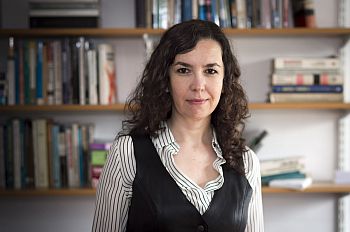Meet Demet Dinler
Demet joined the School of Global Studies in October 2017 having been awarded the first Helena Normanton Fellowship by the University.
Previous Research
A newspaper article on a Flower Auction, a trading platform run by a Flower Cooperative in Istanbul, evoked my curiosity while I was thinking and reading intensively on alternative, democratic forms of economic organisation. Trusting my intuition, I visited the auction and was fascinated by its design and how people enjoyed being there. In the field of development studies, we tend rightly to be critical and cautious about market-led development, which often creates or perpetuates inequalities for small producers and labourers. But in this particular case, a market institution was specifically designed to empower and benefit both small farmers and buyers, without any need for external regulation by the state. I had never thought that exchange relations could assume such an entertaining, innovative and egalitarian form! I first wanted to explore the forms of knowledge and skills behind this institution, then decided to expand the research to the broader cut flower industry in order to compare various actors who shape the market differently.
My interest in markets and multi-sited ethnographic research goes back to my PhD studies. My doctoral dissertation was an analysis of the informal and formal rules, customs, laws, relations of trust and gift, which regulated the recycling market. I decided to follow up a similar line of enquiry in other sectors and my encounter with the flower market was a happy coincidence to decide the topic of my next research project.
I have always been amazed by the diversity of knowledge and resources through which individuals coordinate and regulate their interactions in their everyday practices. Many of these historically contingent institutions might have served exploitative and oppressive ends, but there have always been and still are multiple potentials, which have to be mined for emancipatory purposes. I find the investigation of the local and global markets a suitable means for this end.
Throughout my education I learnt from and was inspired by the excellent, sometimes agenda-setting research produced by Sussex scholars in development, anthropology and international relations. I genuinely desired to be a researcher at this very special institution, which, now that I experience it, is also strongly committed to the principles of equality and diversity - which resonates in the choice of the fellowship’s title, Helena Normanton.
My most significant achievement so far is the publication of my book, Ontological Problem of the Worker: Essays on Class, Masculinity and Emotions (Metis, 2014). It is a book of ethnographic essays, which combine research data, theoretical reflections, individual stories of workers and my personal experience as a researcher and activist.
Current Research
This is a two-year fellowship, which covers my full salary, and an additional allowance for fieldwork expenses, which will enable me to travel to various sites for my research. I am co-appointed to the Departments of International Development and Department of Anthropology where I get excellent mentorship and support by the Heads of Department, Anke Schwittay, Geert de Neve and my research contact, Peter Luetchford.
I research the whole process of the social life of the cut flower from the point of production until you buy it in your supermarket and ask what the institutional basis for fairer and more sustainable relations of production and exchange would be. My research lies at the intersecting point of the fields of development studies, anthropology of markets and social studies of science and technology. I explore how farmers, traders and experts conceive and govern nature and market in the case of the cut flower industry.
Following the journey of a flower in rural fields, greenhouses, laboratories, auctions, shops and logistical spaces will be like completing a big jigsaw puzzle. Each new site will offer me further clues to uncover the hidden realities about the life of a cut flower as a commodity. I will look at the same object through the lenses of different actors, by adopting new angles so that what remains in the shadow at one stop of my journey is enlightened at the next one.
For the first time in my academic life, I will work with non-human living organisms such as flowers and in rural fields rather than an urban context. Although I was trained in social sciences, I always enjoyed reading evolutionary biology and trying to make connections between natural and social sciences. Now I have a chance to observe closely how flowers grow and pollinate, how farmers engage with nature, and how experts work on the health of flowers. I feel that this will influence my fieldwork practice and theoretical thinking in a creative way.
The Future
In the future, I would like to take part in larger-scale, collaborative, multidisciplinary research, involving social scientists, natural scientists and engineers, contributing to the design of alternative, egalitarian institutional forms for organising social and economic life. As the great anthropologist Marc Bloch says, in an uninterrupted flow of transmissions where all of us change all the time, what is interesting is not change, but how certain things are able to last. Finding out these enduring patterns and then thinking about how we can establish institutions, which can last to sustain emancipation and equality would be the overarching concern underpinning my research. Of course it is with meticulous, micro-level, in-depth research that we can dare to give partial answers to such big questions.
Sussex is an amazing place to nurture such aspirations, because we are constantly exposed to unusual encounters. It is by deliberately violating boundaries between disciplines and connecting various spaces of knowledge and experience that one can learn to be innovative.
More information on Demet's research can be found on her Sussex webpage.
More information on the Helena Normaton Fellowships can be found on the Sussex Research website.

